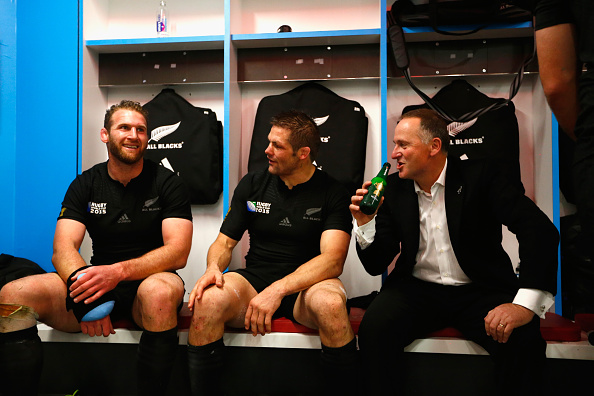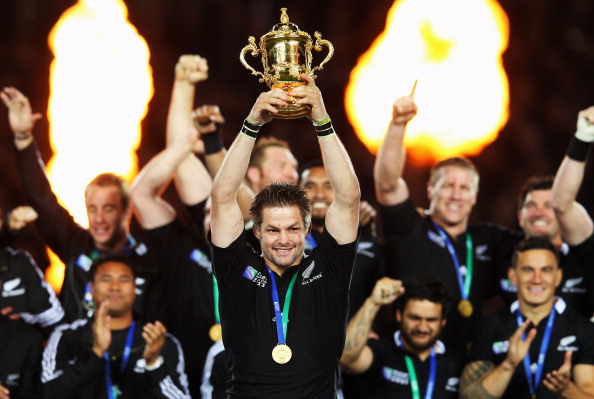If Richie McCaw becomes the first captain to lift the Webb Ellis Cup at the end of two consecutive Rugby World Cups by leading his team to victory in the final this weekend, it will be the happiest of endings to a career which has been something of a fairy tale, but which has had its down times as well as its ups.
Undoubtedly the lowest moment of the record-breaking Test star’s career came when the All Blacks lost to France in the 2007 World Cup quarter-final at the Millennium Stadium. While McCaw and everyone who calls New Zealand home blindly blamed referee Wayne Barnes, the rest of the world pointed the finger at McCaw’s naïve leadership. Trailing 20-18 in the final quarter, but with plenty of possession from which to conjure a winning score, the All Blacks battered away at the line in search of a try or a penalty, instead of setting up what could have been a simple drop-goal to take the spoils.
McCaw and his side slunk home with their tails between their legs and the questions about whether they could close out a big game on the biggest stage of all were asked constantly for the next four years.
On 23 October 2011 New Zealand answered their critics to an extent by beating France in the World Cup final and lifting the golden trophy for the first time since 1987, but because that tournament was played on their home soil and because they only squeaked home 8-7, the wider rugby public could still entertain some doubts about their ability to bring home the bacon when it really matters. Between July 2008 and the end of the 2011 World Cup, the All Blacks had lost three games by a single score when they were trying and failing to come from behind and had been beaten twice more by seven points or fewer after leading during the last five minutes. Yes – there was still evidence of a tendency to bottle it.
In the last four years they have got better at fighting back from a deficit to win a close game. They have done it four times in that time-span, most memorably on 24 November 2013 when Ireland led them 22-7 at half-time but a try from Ryan Crotty and an Aaron Cruden conversion snatched the win for New Zealand in stoppage time. Even better, since 2011 the All Blacks have defended a narrow lead and gone on to win five times – including last weekend’s semi-final.

Leaders: Read, McCaw and NZ Prime Minister John Key after last Saturday’s semi-final. (Getty Images)
After that 20-18 victory over South Africa, coach Steve Hansen and McCaw faced the media at Twickenham with broad smiles and Hansen was full of praise for his captain and the progress he has made since that darkest of days in Cardiff eight years ago.
“We have probably got the greatest skipper and the greatest player we have ever seen, talking from a New Zealand point of view,” Hansen said. “In ’07 as a young captain he was criticised a lot and I know that hurt him. He has grown. We, as a team, have grown and we have a leadership group on the field that has a massive amount of self-belief.”
That core of experienced leaders includes Dan Carter (111 caps), Ma’a Nonu (102), Conrad Smith (93) and Kieran Read (83). The ups and downs they have been through have made them mentally tough as teak now.
“We have had moments, and there’s an obvious one against Ireland, when we had had to keep the self-belief,” said Hansen, harking back to 2013. “So we get to nights like tonight and it’s about the process – what have we got to do right now; if we get that right, what have we got to do next. When you have played 140-something Tests and other guys around you have played over 100, you have got guys on the park who can do that. It is a learned skill, like anything.”
Full-back Ben Smith paid tribute to the tactical wisdom Carter now applies to his game. “He is a great player to get us in the right areas of the field. Managing the territory at the end of the game (against South Africa) helped us win the match. The old heads see the game really well and give us the right advice so we can go out and do our job. It’s great to have them out on the field.”
When they line up against Australia in Saturday’s final (Twickenham, 4pm), New Zealand won’t have the monopoly on experience. The Wallabies’ starting line-up for last Sunday’s semi-final against Argentina boasted 876 caps, which was a record for any World Cup match, and featured no less than three former Australia captains, as well as the current one. However, the All Blacks haven’t lost a Test by a single score since October 2014, when South Africa defeated them 27-25 in Johannesburg with a late penalty from Pat Lambie. Results from the last four years suggest that if New Zealand are ahead in the second half, they will not relinquish that lead, so the Wallabies need to bounce them out of contention before the business end of this final if they are to win it.
For the latest Rugby World subscription offers, click here.







